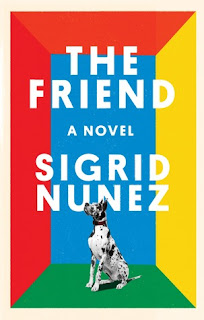And how about that cover, that sunset, right? Looking up from one's reading, or one's life, to notice the actual colors of the actual sky is a crucial part of this book, in which what people say and do is completely constricted by their circumstances. This story is set in the "troubles" or "sorrows" of Northern Ireland, not ever named, like most of the characters. To stay alive during the political/religious conflicts raging all around, people have to contort themselves--their speech, their behavior, their emotions. Part of the "right time" to read this, for me, connects to the current constrictions of the pandemic, and part, the main part, is how it evokes the current political divide in the country I live in. We can't really talk to each other, kindly and well, because we're living in different realities. It's awkward, dangerous, and strange.
The other book I read--quickly, sometimes skimming--at the "right time" was Together in a Sudden Strangeness: America's Poets Respond to the Pandemic, edited by Alice Quinn. This is a new book at the library, I was the first to check it out, and I didn't want to keep it too long, which is one reason for the skimming, another being self-protection. I didn't want to dwell too long in pandemic reflections, so if a poem was too long, too prosey-looking, or with too many virus-related words glaring up at me, or if it seemed too easy, bordering on the cliched or sentimental, I skipped it. Instead, I went for the shorter poems, with simple, direct language--"simple" being quite different from "easy" in my meaning here, with simple language so often the container for rich complexity.I want to share some favorite lines, images, facts, and, of course, random coincidii with you.
I loved "Facetime" by George Bilgere, partly about the return of the animals to human-deserted places, and partly about phoning up the eels! I loved Sarah Paley's strong sonnet about a store cashier, "At the Hardware Store on the Island (March 21, 2020)," and noted the coincidence that Paley has a chapbook forthcoming from Eyewear Publishing called The Autobiography of an Eel. A coincidence of eels! Who gnu?
In "May Day," by Nicholas Christopher, I heard the woman crying out from a dark corner. I joined a man and his wife in delighting in watching a couple across the way who played cards every night in "Cards," by John Freeman. It reminded me of my parents playing cards, and also playing characters playing cards in The Gin Game. I loved how the sequestration in "As If," by Dana Levin, has shifted from "natural sloth" to "domestic industry" when suddenly two Labs, one black, one yellow, appear on Mount Atalaya in the past... Yes, anything can happen!I loved learning about "arborial cemeteries" in Gail Mazur's wonderful and funny "Matzoh." I was sad to learn this personal history detail from "Under Juncos, the Baby Stones," by Tess Taylor, which begins:
Grandmother, born 1918,
half-orphaned, mother dead of the flu,
your father, widowed, alone,
taped your mouth shut
to keep you from crying.
There is the connection of our pandemic to the 1918 pandemic, and also to whatever contortions of grief and circumstances might be happening now. My heart broke to read the phenomenal "An American Nurse Foresees Her Death," by Amit Majmudar, where, sadly, the title tells the story. With "Leaving Evanston," by Deborah Garrison, I sympathized with the theatre students having to leave school before their spring showcase production, before their Commencement, and thus also with all the students whose lives and expectations were disrupted this past spring...and likely will be in the spring to come.
"How I wish feeling terrible felt useful, as it did when I was a teenager," says Nicole Cooley in the poem "At CVS Wearing a Mask I Buy Plastic Eggs for My Daughter." That resonated, and also reminded me of the narrator of Milkman, who is seventeen and eighteen when the main events happen; it's hard to come of age when the adults don't know how to show you, teach you, bring you along. And in "Poem for My Students," by Sharon Olds, I encountered "chain-reading" (like chain smoking), something I do, reading one book right after another.
Despite my skimming and skipping, I found much to marvel at in ...a Sudden Strangeness, including this deftness with line and stanza break in the beautiful and simple "Quarantine" by Dave Lucas, that begins:
You could not come to me
so instead I set out for you
these lines.
And I identify with this impulse in "A Private Life," by Mark Wunderlich, which I may, though lacking in chickens, follow:
I think when this is done, I'll stay
shut in, tending my hens, mending
the threadbare life nobody will see.
















